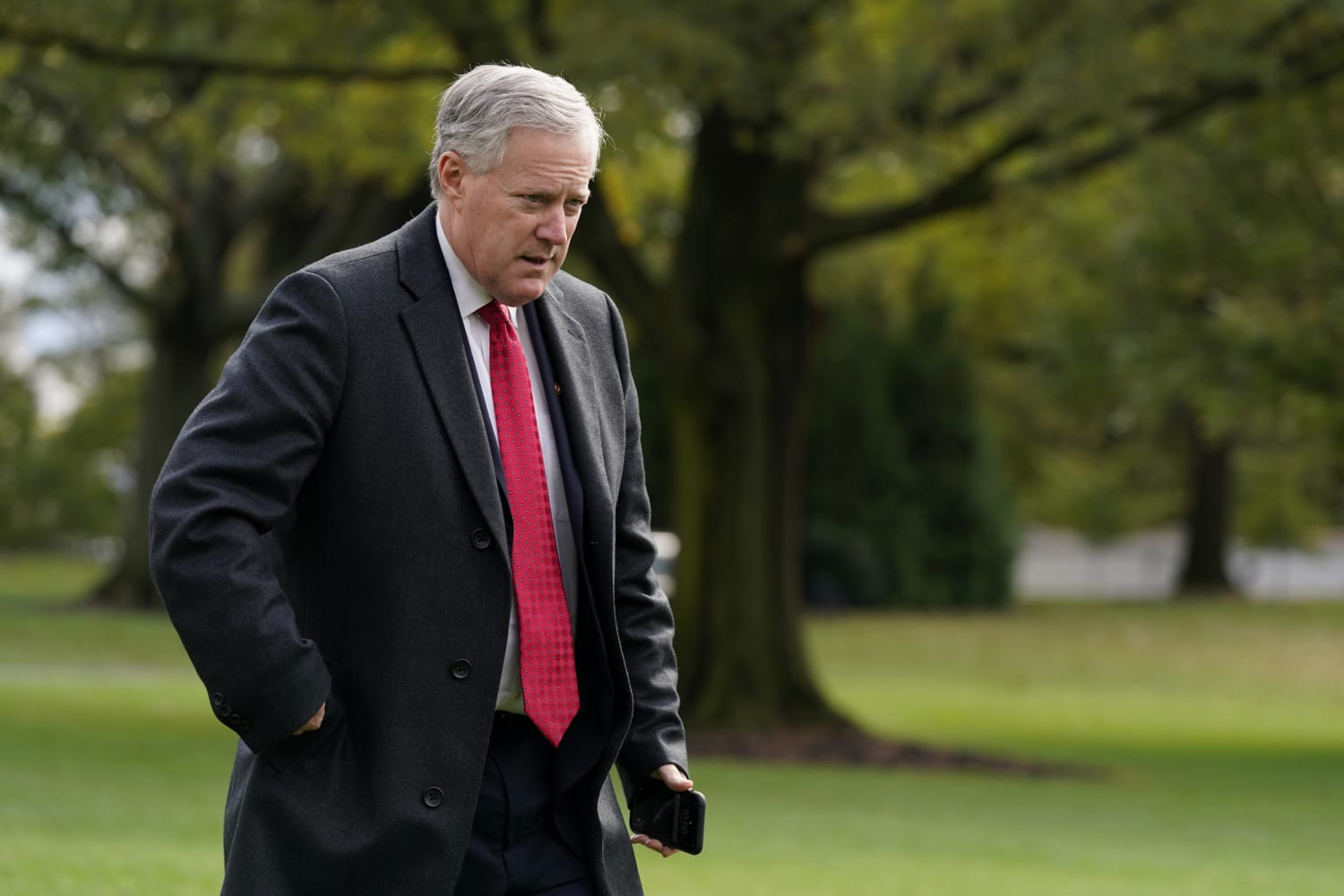[ad_1]

Former White House chief of staff Mark Meadows, one of the defendants charged with racketeering in the Georgia 2020 election probe, took the witness stand for five hours Monday in an attempt to bolster his bid to move the Fulton County case to federal court.
Former President Donald Trump and 18 co-defendants, including Meadows, were booked at the Fulton County Jail last week in connection with efforts to overturn the 2020 presidential election results in Georgia, a battleground state.
Testifying before U.S. District Judge Steve C. Jones, Meadows portrayed the conduct he’s charged with as part and parcel of his work as Trump’s chief of staff, which he described as a “24/7 kind of job.” Asked by his attorney George Terwilliger whether his duties ever intersected with political matters, Meadows said almost everything the president does has a political reaction.
Fulton County District Attorney Fani Willis’ office contended in court filings that Meadows crossed a line, including by arranging and joining a call on which Trump pressured Georgia Secretary of State Brad Raffensperger to “find” votes that would change the state’s election results.
“Federal law prohibits employees of the executive branch from engaging in political activity in the course of their work,” they noted, pointing to the Hatch Act, a law Meadows once told Politico “nobody outside of the Beltway really cares” about.
The law “bars a federal employee from ‘us[ing] his official authority or influence for the purpose of interfering with or affecting the result of an election,’” prosecutors noted.
Anna Green Cross, a lawyer for the district attorney’s office, asked Meadows on cross-examination what, if any, federal goal he was furthering by taking part in meetings and calls challenging the election results. Meadows said he believed the federal purpose was to ensure that there were free and fair elections in the U.S.
She asked him about the purpose of the Raffensperger call, and he said it was to come to a less litigious resolution of the Trump campaign’s then-pending lawsuit against the state. Cross asked whether settling a private lawsuit served any federal purpose, and Meadows replied that his duties were broad.
Asked what he thought would be crossing a line, Meadows said it would be if he’d been asked to speak at a campaign rally. Cross then pressed him about whether solely advancing the interests of the campaign would be outside the scope of his responsibilities.
“I would not agree with that,” Meadows said.
Taking the witness stand for the DA’s office was Raffensperger, who testified for about an hour Monday.
Jennifer Little, who is a member of Trump’s legal team, and an attorney for former Justice Department official Jeffrey Clark, who is a co-defendant in the case, were watching the testimony from a courthouse overflow room.
In court documents this month, Meadows’ lawyers argued that the charges all pertain to official actions he took while he worked for the president.
“Mr. Meadows has the right to remove this matter. The conduct giving rise to the charges in the indictment all occurred during his tenure and as part of his service as Chief of Staff,” Meadows’ lawyers wrote in a 14-page filing.
They requested “prompt removal,” citing a federal law that allows U.S. officers to remove civil or criminal trials in state court for actions alleged to have been taken “under color” of their offices to U.S. District Court. Meadows also intends to file a motion to dismiss the indictment “as soon as is feasible,” his lawyers wrote.
They also said Meadows’ duties as chief of staff included arranging Oval Office meetings, contacting state officials on Trump’s behalf, visiting a state government building and setting up a phone call.
“Nothing Mr. Meadows is alleged in the indictment to have done is criminal per se,” they wrote. “One would expect a Chief of Staff to the President of the United States to do these sorts of things.”
Jones did not issue a ruling Monday. He said that proceedings in state court could continue, and that Meadows would need to be arraigned on Sept. 6 as scheduled if hasn’t ruled by then.
Meadows was charged with two counts in the sprawling 41-count indictment: one of violating Georgia’s Racketeer Influenced and Corrupt Organizations Act and one of solicitation of violation of oath by a public officer.
He surrendered to authorities and was released after a federal judge in Georgia denied his bid to delay his arrest.
“Meadows argues that his federal officer status and federal immunity defense protect him from being arrested and being brought to trial in state court,” Jones wrote, noting that his case had not been moved to federal court.
“While the Court understands Meadows’s argument that the federal immunity defense includes an immunity against arrest, the statutory language” of the applicable law “is clear that the state court proceedings continue until the Court has assumed jurisdiction over the case.”
The indictment by a Georgia grand jury alleges Meadows, Trump and other unindicted co-conspirators “unlawfully solicited, requested, and importuned” Raffensperger on Jan. 2, 2021, to help them reverse the results of the presidential election.
Willis last week subpoenaed Raffensperger and his former lead investigator, Frances Watson, to testify at Monday’s hearing about Meadows’ effort to move his case to federal court. A spokesperson from Raffensperger’s office declined to comment on the subpoena at the time. Meadows testified in the morning and was due back for more cross-examination after lunch.
Meadows, a former congressman from North Carolina who now lives in South Carolina, previously fought efforts to testify before the special grand jury in Willis’ probe about his actions in the final weeks of Trump’s presidency amid his refusal to concede the 2020 election. Meadows, however, was compelled to testify after he lost court challenges.
Meadows also refused to comply with a subpoena to testify before the House Jan. 6 committee. The House voted in favor of criminal referrals for Meadows to the Justice Department, which declined to prosecute him.
[ad_2]
Source link
